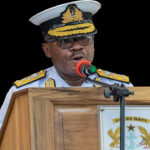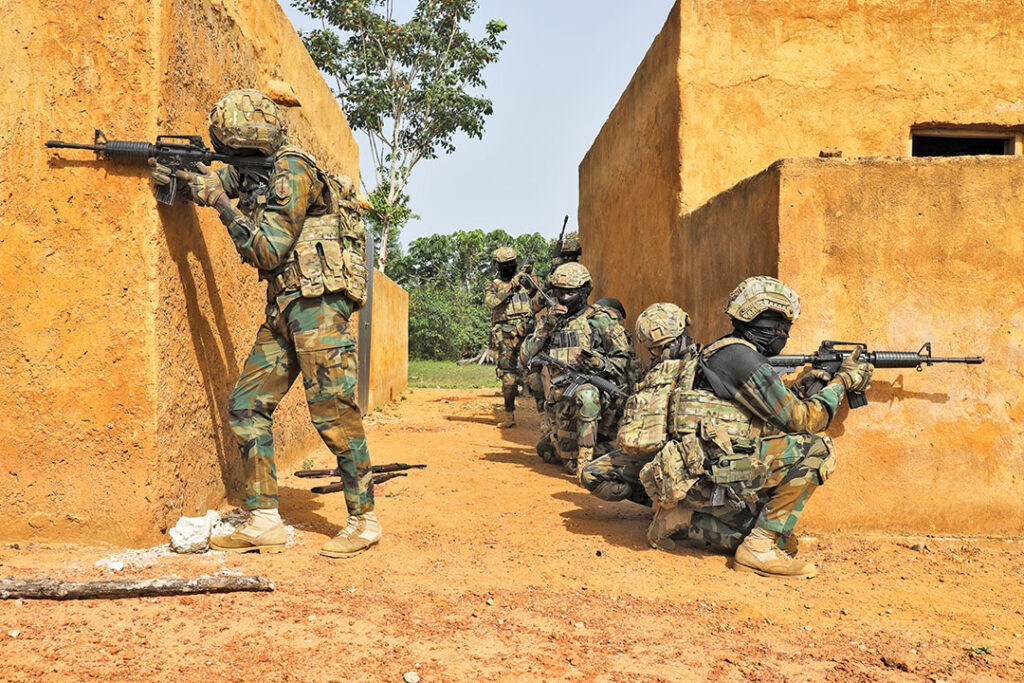 Vice Adm. Seth Amoama, chief of the Defence Staff of the Ghana Armed Forces, spoke on “Ghana’s Military Efforts in Curbing Terrorism” at the first International Defence Exhibition and Conference on October 12, 2022, at Burma Camp in Accra, Ghana. His remarks are taken from an account published by the Ghana Peace Journal and have been edited for space and clarity.
Vice Adm. Seth Amoama, chief of the Defence Staff of the Ghana Armed Forces, spoke on “Ghana’s Military Efforts in Curbing Terrorism” at the first International Defence Exhibition and Conference on October 12, 2022, at Burma Camp in Accra, Ghana. His remarks are taken from an account published by the Ghana Peace Journal and have been edited for space and clarity.
Ghana in the past few years has deployed a multisectoral all-of-government-and-society approach to contain any possible spillover of terrorism and violent extremism.
The Ghana Armed Forces (GAF) in response has also devised a well-thought-out military strategy and implementation plan to deal effectively with Ghana’s external threats.
Ghana has been relatively stable within a subregion that has been beset with a myriad of security challenges.
In the past decade, the threat of al-Qaida, Jamaat Nusrat al-Islam wal Muslimin, Islamic State West Africa Province and others has spread gradually from northern Mali through Niger, Burkina Faso, and more recently northeastern Côte d’Ivoire, and northern Togo and Benin.
The activities of violent extremist organizations (VEO) and terrorist armed groups (TAG) have preoccupied regional and national security discourse. Of major concern is the southward thrust of the VEOs and the TAGs in West Africa and the Sahel into the coastal states along the shared borders of West Africa.
As a founding member of the Accra Initiative, the government of Ghana continues to strengthen multilateral cooperation, [and] information- and intelligence-sharing with Togo, Benin, Burkina Faso, Côte d’Ivoire, Niger, Nigeria and Mali to prevent the threat of terrorism and violent extremism in the subregion through the Accra Initiative and other bilateral arrangements.
So far, Operations Koudanlgou I, II, III and IV have been conducted along the shared borders of the Accra Initiative countries with relative success, and upon the agreement of the parties to the Accra Initiative, a joint border operational plan has been developed. The plan was initiated in the latter part of 2021, and by December 2022, the Headquarters of the Multinational [Joint] Task Force would be established based in Ghana. The force commander has been appointed, and we are working toward establishing the headquarters in Tamale.
One of the key elements of regional security has been the adoption of non-kinetic approaches to security through building resilience and national cohesion. Recently the Ministry of National Security launched a project called “See Something, Say Something” to bring everybody — all aspects of the society — onboard in the fight against terrorism.
Government is also increasing state presence across the country so that there would be no ungoverned spaces anywhere, and also decentralizing development and presence of the security and intelligence agencies across all parts of the country.
Since the formation of the Ghana Armed Forces, the global security landscape has witnessed a significant shift from conventional adversarial engagement to asymmetric warfare. This is characterized by terrorism and insurgency activities, and the GAF’s response strategy to the threats has evolved as well.
Changes in doctrinal approaches: A shift in training doctrine to accommodate asymmetric threats and warfare will include all levels of training, including personnel development outside the country. Another thing that we have introduced is establishing a Doctrine and Training Command to look at our doctrines and review them in consonance with current threats.
A restructuring of the force: This means a renewed drive toward smarter and smaller agile units capable of responding and conducting surgical operations to meet strategic objectives backed by logistics support structures.
Prevention: The National Counter Terrorism and Counter Insurgency Strategy outlines the use of intelligence-led operations and information war operations.
The southward thrust of terrorists’ activities, especially from Mali, Niger, Burkina Faso and the larger Sahelian region, remain high and likely to persist.
The impact of national and military efforts is yielding the needed results, as such collaboration with strategic partners remains critical and necessary in order to consolidate our gains. Consequently, Ghana’s resolve to maintain bilateral and multilateral relations is grounded on peaceful and democratic states ensuring the survival, safety, and well-being of its citizens from imminent and potential threats.

